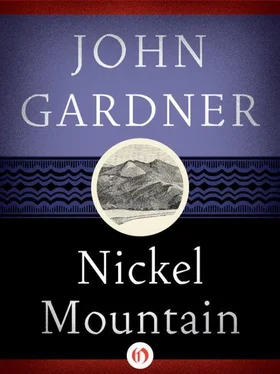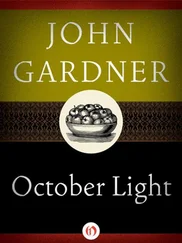As always, it was hard to put himself to bed. It had become a ritual with him, this waiting between the peeling-away of the sweat-soaked shirt from chest, belly, arms, and the unbuckling of his wide leather belt. And partly necessity, of course. His health. Doc Cathey had chortled, “You lose ninety pounds, Henry Soames, or you’re a goner. Like your old man before you. You’ll sit up in bed some one of these mornings and you’ll turn white with the effort of it, and click.” Doc had snapped his fingers, brown, bony fingers that wouldn’t go fat if you fed ’em on mashed potatoes for a month. And his voice had been aloof, amused, as though he’d gotten his JP and MD jobs mixed up. Doc sometimes did that, people said, laughing about it while Henry dished up their orders. That had been before Henry went in for his checkup; otherwise maybe he mightn’t have noticed Doc’s manner. Doc would talk to an old offender, they said, in his kindly-family-doctor voice and to an expectant mother with his high and mighty sneer. And he, Henry Soames, had paid a dollar to be told what he’d known for most of his life, right down to the click, and ten for pills, and four dollars more for the little brown bottle that ruined his appetite all right but made his belly ache like he had the worms and his eyes go yellow in the mirror. A man didn’t owe his flesh to his doctor; he could still choose his own way out. Three dollars’ worth of pharmacist’s bilge poured down the sink was maybe thirty bellyaches avoided. Old Man Soames had used whiskey for the pain, and whiskey — that and the little white pills — would be good enough for Henry.
He sat still on the edge of the bed, breathing deeply. There was a little wind outside. On the hill just beyond the lean-to window the scraggly pines were swaying and creaking. Between the pines there were maples, lower than the pines, and below the maples, weeds. As always on windy nights, there was no sign of the low-crawling fog. He sometimes missed it a little when it didn’t come. Because it brought customers, maybe. “A man gets to feeling weird,” one of the truckers had told him once. “Ten miles of sharp turns stabbing out at you from the mist, cliffs as gray as the fog itself to tell you you’re still on the road, and now and then a shadowy tree or a headlight, dead looking, everything in sight, dead. And lonely as hell. Brother.” He’d shivered, hunching his shoulders in for warmth and sucking down the coffee Henry served him on the house. From the wide front window of the diner Henry would see the fog, just after sunset, sliding down the hill like an animal; and then again sometimes the fog would just appear out of nowhere, ruminating. It would lose itself here in this pocket between two hills, and then in the morning sun it would shrink up into itself and vanish, leaving the trees, wet and the highway as hard and blue as the curved blade of a knife. The lines of the hills north and south of Henry’s Stop-Off would be sharper then, and the barns that belonged to Callie’s father would stand out like tombstones after thaw.
But tonight was a perfect night for truckers; it was foolishness to sit here hoping, if he was. Which he wasn’t. He’d had one heart attack already, and he’d never known it at the time. It took all his effort to keep his mind off that. When a man’s heart stopped, the whole machine ought to shudder, lights ought to flash in the head, the blood should roar: But his heart was scarred, and he hadn’t the faintest idea when it had happened, as if some hand had flicked a switch off, then on again, letting the machine freewheel for an instant and then dig in as before. He might have died without ever knowing he was dying — a year, a year-and-a-half ago maybe, and all that had happened since might have been nothing.
A truck was coming up 98 now, but he wouldn’t pull in even though the neon was on, as it always was, and one of the three lights in the diner. He’d want to push on, no doubt, to please his boss or his union or the people at Morse Chain. But maybe a drunk would stop, seeing the light burning away in there like an altar lamp. The semi was speeding-up on the quarter-mile level run in front of the Stop-Off for the hill a little ways north — the hill that would rise and suddenly break, pushing your heart up out of your chest, to drive three miles down banked curves into New Carthage. The truck was rolling now, maybe up around fifty, depending on the load. The grind of gears came, meaning he was halfway up the hill, and the new engine scream pulling down to a low, pained roar; another shift, to low, to low-low, the pounding throb — far away, though — and then the purr at the peak of the hill and the purr rising, pulling back against the thrust, strangling itself on the downgrade. All a mile away now, from the sound of it; so faint that you couldn’t know how much of it you heard and how much was only a tingle in your skin.
Maybe he should get out the Ford, he thought. But no. He was tired, and he was in no mood, these days, for rattleassing over the hills, thanks to this tightness in his chest. A bad sign, no doubt. He’d have to draw up his will, as Doc Cathey had told him.
Outside it was quiet now, except for the light breeze. He could smell rain. It would be a good idea to check the cardboard in the window; easier than getting up after he was in bed, when the rain, if it should come, would be batting down and seeping over his dusty windowsill and onto his neatly stacked books — down over the pitiful leather-bound Bible that had belonged to his father and had his father’s and his father’s father’s names penned into it under “Deaths,” between the Old and New Testaments. No other names; no wives, no children. The Bible had ridges across its back like the ridges on one of his mother’s people’s lawbooks, which was funny, when you thought of it, because a lawbook was what it had been for his father. And that too was funny, because now it had a fermented, museum smell from the rain that always seeped onto the books no matter how careful you were with the window beforehand.
Beside the old Bible he could see his father’s anemic-looking schoolbooks and, on the shelf below, National Geographics, Shakespeare, an old almanac with notes in the margin, written in his father’s childish hand. These books, too, had the musty smell, and something more complicated: a burnt-out, un-lived-in smell like — he had to think a moment — a hotel room. A sudden, unexpected feeling of guilt bloomed inside him, pushing up through his neck. He knew what it was for an instant, but then he had lost it again. He concentrated his gaze on the books, but whatever it was that had come to him was gone.
“Damn rotten shame,” he said aloud, vaguely.
His father had been a dairyman first, Henry remembered his mother’s saying, and he’d failed at it, no doubt because of the pain of hauling his weight like a twelve-foot cross from cow to cow. After that the poor devil had sold apples from his orchard, and then, or perhaps before that, he’d raised sheep, painted roadsigns, clerked in the feedstore in Athensville. Nothing had worked. In spite of his tonnage, he had been a sentimental dreamer, as Henry’s mother had put it. “Should’ve been a monk.”—Making sure her little Henry would not trudge in his father’s footsteps. One job after another would cave in under his father, and she, who came from a fair-off family, lawyers mostly, would give him just barely enough of her money to set him up in the new project which, sure as day, would fail. He was as simple and harmless all his life as a great, fat girl. It was the floundering harmlessness, no doubt, that Henry’s mother had hated in him. And so she’d driven him to schoolteaching at last. Because, she had said, he’d been through high school and couldn’t do anything but read books. “You don’t need capital for teaching school. Maybe it’ll make a man of you,” she’d said. And so Henry’s father had suffered the final indignity, plopped sweating in front of people like Frank Wells, enduring their pranks as a woman would, with his own son in the classroom, and in between times teaching them multiplication and poetry and Scripture. Which explained why Henry’s mother’s name had not been put in the Bible under “Deaths.” It was hard to say why his grandmother’s name wasn’t there. Maybe his father’s womanishness had become, at last, a hatred of women in general, or at any rate a refusal to admit that they lived and died. His last delusion: that here at least, between the Old and New Testaments, a man stood on his own. (But Doc Cathey had said once, pushing his crooked knuckles down in his coat’s side pockets and shaking his head, “Solid as stone your daddy was. Solid as stone.”)
Читать дальше











